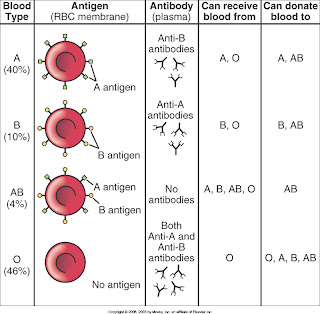While we were learning about blood types, I strolled across this chart online that helped me understand the four different blood types. The chart not only tells you which antibodies that each blood type produces, but it also shows the type of blood that each one can recieve and which blood type that each one can donate too. It was easier to remember when all the information was collected together. The article Transfusion Reaction- Hemolytic from the cite PubMed Health was also very beneficial when it came to figuring out the importance of blood types in blood transfusions. If given the wrong match of blood for your blood type, the body reacts and destoys the blood cells. The part below is from the Transfusion Reaction article, but I believe it sums up the reasons why blood types are very important in blood transfusions.
Causes, incidence, and risk factors
Blood is classified into different blood types called A, B, AB, and O.
The immune system normally can tell its own blood cells from blood cells from another person. If other blood cells enter your body, your immune system may make antibodies again them. These antibodies will work to destroy the blood cells that the body does not recognize.
Another way blood cells may be classified is by Rh factors. People who have Rh factors in their blood are called "Rh positive." People without these factors are called "Rh negative." Rh negative people form antibodies against Rh factor if they receive Rh positive blood.
There are also other factors to identify blood cells, in addition to ABO and Rh.
Blood that you receive in a transfusion must be compatible. Being compatible means that your body will not form antibodies against the blood you receive. Blood transfusion between compatible groups (such as O+ to O+) usually causes no problem. Blood transfusion between incompatible groups (such as A+ to O-) causes an immune response. This can lead to a very serious transfusion reaction. The immune system attacks the donated blood cells, causing them to burst.
I got a good laugh out of this little cartoon, and it fit well with the objective so I thought I would include it in. :)


No comments:
Post a Comment